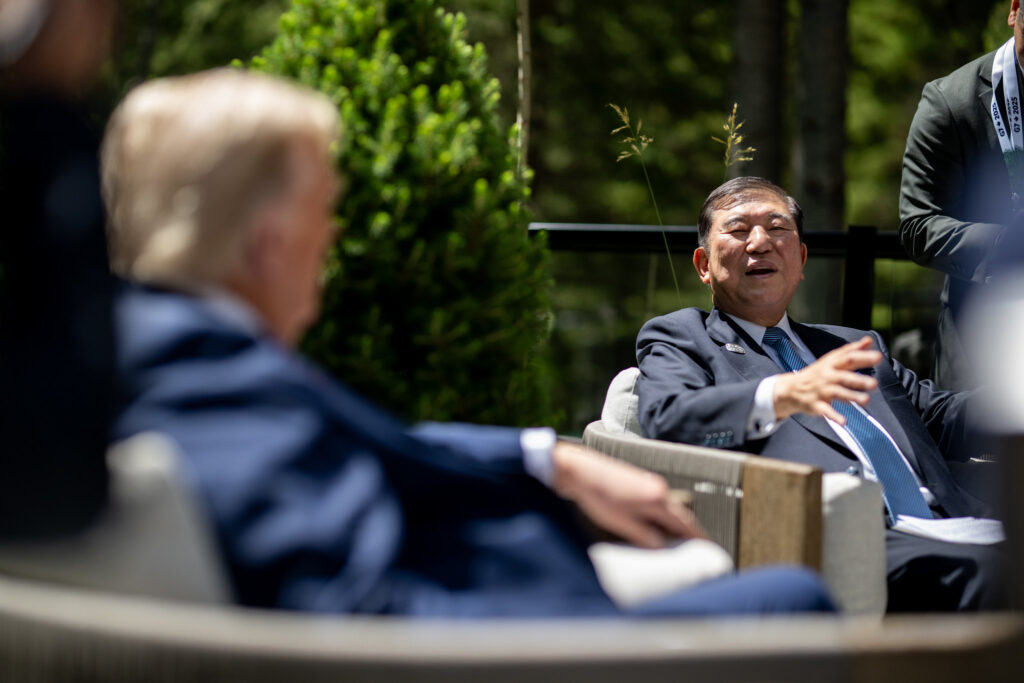The Peninsula
Korea Policy Series: Japan’s Adjustment to a Scary New World

The following policy brief is part of a limited series from the Korea Economic Institute of America inspired by the latest edition of Korea Policy, Volume 3 Issue 1. You can read the author’s full paper by clicking here.
The U.S. presidential election marked the beginning of a new era of retrenchment. The new Donald Trump administration, inaugurated in January 2025, has swiftly shifted U.S. priorities to emphasize domestic issues while reshaping the global order. The U.S. government now favors transactional and zero-sum relations with other countries, including allies across Europe and the Indo-Pacific. The first few months of the second Trump administration have instilled deep uncertainty in Japan, the United States’ most important ally in the Indo-Pacific region. At a time when the country is grappling with a shaky and unpopular prime ministership under Shigeru Ishiba, it is paramount for Tokyo not to lose sight of its core national interests while focusing on specific areas of convergence with its longstanding ally and strengthening its position in the region.
Japan is deeply worried about the implications of the United States losing its so-called unipolar moment. Japan is a status quo power par excellence, having greatly benefited from the unipolar post-Cold War era, during which the United States was the preeminent power. The second Trump administration has signaled its intention to change the existing global order by shifting its primary focus to domestic issues, which raises new questions for allies across Europe and the Indo-Pacific.
As stated numerous times by Japanese officials and in strategic documents, Japan’s main objective is to uphold the liberal international order based on the rule of law and to oppose any attempts to subvert it. The Trump administration’s transactional approach and its frequent demands toward and criticisms of allies have eroded confidence in the United States and are putting Japan in an increasingly difficult position. Tokyo is now caught in a dilemma between maintaining a strong relationship with Washington, which represents the cornerstone of the country’s national security strategy, and continuing to pursue its strategic goal of preserving the liberal international order—a goal currently not shared by Washington.
Policy Recommendations
- Focus on China as a common challenge: The Trump administration has consistently highlighted China as a major threat, an assessment shared by Japan. Jointly countering China’s aggressive posture in the Indo-Pacific and strengthening U.S.-Japan coordination, specifically on economic security, could be a renewed focus and priority for both the Trump and Ishiba administrations. Differences in the U.S. and Japanese perspectives of the Chinese threat will continue to exist, but it is essential for officials in both countries not to lose sight of common challenges and objectives vis-à-vis China.
- Strengthening Japan’s position in existing minilaterals and diversifying partnerships: It is fundamental for Japan to show continued interest and investment in existing minilateral frameworks in the Indo-Pacific. At a time of U.S. retrenchment, minilaterals offer opportunities for Japan to showcase its own nuanced style of diplomacy and leadership in these frameworks. Japan can also serve as a bridge between the United States and other key actors in the Indo-Pacific, especially ASEAN countries. At the same time, Japan is incentivized to bolster its partnerships and build a strong network beyond the region— in particular, European countries offer various potential areas of cooperation, such as trade and defense, for Japan, which advances Japan’s goal of preserving the rules-based international order.
- Renewed U.S.-Japan emphasis on the Free and Open Indo-Pacific (FOIP) vision: Japan’s FOIP vision, unveiled in 2016 and wholeheartedly endorsed by the first Trump administration, could come back stronger at the center of U.S.-Japan relations and the U.S. Indo-Pacific strategy. FOIP has already implemented some successful initiatives through bilateral and multilateral cooperation on many different areas. The concept, which has been embraced by every Japanese prime minister since its announcement, could be revamped under the second Trump administration and highlighted in the U.S.-Japan alliance as an adaptable tool to preserve peace and stability in the region.
Given the Trump administration’s retrenchment and renewed emphasis on domestic issues, it might be tempting for the currently fragile Ishiba government to also keep its focus on internal problems. This, however, risks widening the gap between the two allies. Instead, the new sense of uncertainty brought about by the Trump administration could become an opportunity for Japan to rethink its approach to this U.S. administration by highlighting common challenges and objectives while strengthening its network of partnerships and role in the Indo-Pacific and beyond.
Sayuri Romei is a senior fellow at the German Marshall Fund Indo-Pacific program. Views expressed here are the author’s alone.
Image from the White House Flickr account.
KEI is registered under the FARA as an agent of the Korea Institute for International Economic Policy, a public corporation established by the government of the Republic of Korea. Additional information is available at the Department of Justice, Washington, D.C.
